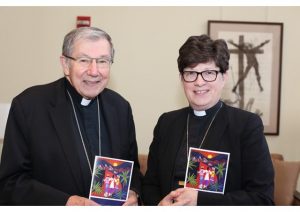On the Way: Lutheran and Catholic Churches Come Closer Together

The Evangelical Lutheran Church of America and the Catholic Church released a very important document entitled: Declaration on the Way: Church, Ministry, and Eucharist. The heart of the Declaration is the Statement of Agreements. On church, ministry and Eucharist, the Declaration draws together a litany of 32 consensus statements, where Catholics and Lutherans already have said there are not church-dividing differences between them. An elaboration of these agreements grounds them in the dialogues’ work. Finally, a more tentative section identifies some “remaining differences” – not intending to be comprehensive but suggesting some ways forward. We would like to share with you the reflection of Bishop Denis Maden who has been working tirelessly in ecumenism.
A few days ago the Catholic-Lutheran ‘Declaration on the Way’ to Unity was released in Chicago and Washington by the Evangelical Lutheran Church in America and the Bishops Committee on Ecumenical and Interreligious Affairs of the United States Conference of Catholic Bishops respectively.
My first feeling on this long-awaited occasion is gratitude to God. Jesus prayed at the Last Supper that all his followers may be one [John 17:21]. St. Paul continually sought unity in the Christian communities [e.g. 1 Cor 1:10-11; Ephesians 4: 1-3]. I am most appreciative of the guidance of the Holy Spirit in our work over the last three years. We prayed regularly for this guidance.
I am grateful for the thousands if not millions of Lutherans and Catholics internationally who work together quietly to feed the hungry, to help displaced families, and to serve their communities in so many other ways. Their example of Gospel living and of practical unity inspires the dialogues.
I am grateful to all those who worked so diligently and thoroughly on Catholic-Lutheran dialogues internationally and in various countries during the last 50 years. It is their hard work that we synthesized in this document.
As a Catholic, I am grateful for the Decree on Ecumenism [1964] of the Second Vatican Council that initiated pastoral collaboration and theological dialogues. I am most appreciative of the continual support of Saint John XXIII, Blessed Paul VI, Saint John Paul II, Pope Benedict XVI and Pope Francis. I often think of Pope John Paul II’s magnificent encyclical on ecumenism Ut Unum Sint [1995] and especially on its discussion of the deep spiritual roots of ecumenism.
Let me encourage all of you who read the document to begin with a time of prayer. Prayer is the appropriate context for seeking the guidance of the Spirit before reading the text.
I encourage a careful reading of the text. Our Task Force spent many meetings poring over the precise wording so that we could be as accurate as possible. The cumulative force of the agreements is amazing. I did not expect so much agreement by so many dialogues on so many issues.
I did experience some challenges. I grew up in the Bronx before the Second Vatican Council. Our overall relationship with Protestants was still one of conflict. Though, in our neighborhood we got along. I still have some ‘flashbacks’ to those days and occasionally encounter inappropriate negative feelings. Perhaps you will too.
The Declaration on the Way challenged me to deeper understanding and balance. The generous and patient service of my colleagues on the Task Force challenged me to live the Gospel more fully.
I find that ecumenical encounters are a road to spiritual maturity. I hope and pray that all who study this Declaration will too.

